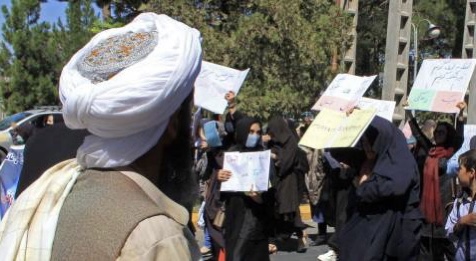There are no products in your shopping cart.
| 0 Items | £0.00 |


AFGHAN special forces had to disperse am angry women's protest in Kabul yesterday after hundreds of them had gathered to demonstrate against the oppressive and misogynistic policies of the Taliban.
Last month, the Taliban swept to power in Afghanistan after seizing the capital Kabul, raising the prospect of a return to medieval Arabic practises under which women were only allowed to beg and bake. Over the last 20 years, women have enjoyed a lot of liberation in Afghanistan, some even becoming judges and the Taliban are now poised to reverse all these gains.
Yesterday, hundreds of women held a march in Kabul during which they laid a wreath outside Afghanistan's defence ministry to honour Afghan soldiers who died fighting the Taliban before marching on to the presidential palace. To disperse them, Taliban special forces fired their weapons into the air.
Protester Maryam Naiby, 20, said: “We are here to gain human rights in Afghanistan. I love my country, I will always be here.”
Flanked by fellow demonstrators, Sudaba Kabiri, a 24-year-old university student, told her Taliban interlocutor that Islam's Prophet Mohammed gave women rights and they wanted theirs. As the demonstrators reached the presidential palace, a dozen Taliban special forces ran into the crowd, firing in the air and sending demonstrators fleeing.
Since seizing power, the Taliban have promised an inclusive government and a more moderate form of Islamic rule than when they last ruled the country between 1996 and 2001. However, many Afghans, especially women, are deeply sceptical and fear a roll back of rights gained over the last two decades.
For much of the past two weeks, Taliban officials have been holding meetings among themselves, amid reports of differences among them emerging. Early on Saturday, neighbouring Pakistan's powerful intelligence chief General Faiez Hameed made a surprise visit to Kabul, where it is believed he came to influence thinking.
Since being ousted from power by the US in 2001, the Taliban leadership had its headquarters in Pakistan and were often said to be in direct contact with the powerful Inter-Services Intelligence agency. Although Pakistan routinely denied providing the Taliban military aid, the accusation was often made by the Afghan government and Washington.
Over the last month, the Taliban have promised a broad-based government and have held talks with ex-president Hamid Karzai and the former government's foreign minister Abdullah Abdullah. However, the make-up of the new government is uncertain and it remains unclear whether hard-line ideologues among the Taliban will win the day.